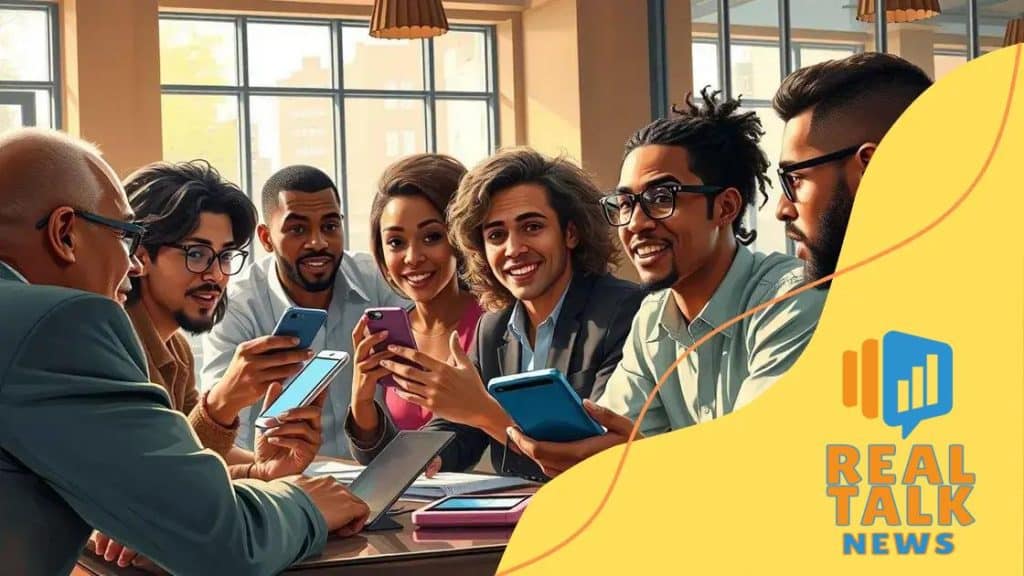How digital platforms are reshaping political engagement

Digital platforms are reshaping political engagement by enhancing communication and participation while introducing challenges like misinformation and polarization, with future trends focusing on live streaming, mobile apps, and AI integration.
How digital platforms are reshaping political engagement is a topic that resonates deeply in our current age. Have you noticed how a simple tweet can sway public opinion? Let’s dive into this evolving landscape.
The rise of social media in politics
Social media has dramatically influenced politics, providing a platform for diverse voices. This change has transformed how we communicate and engage in political discourse.
Connecting with Voters
Political candidates now utilize social media as a key tool to connect with voters. Platforms like Twitter and Facebook allow them to share their messages directly. This direct communication can lead to strong relationships with their audience.
Moreover, social media enables real-time feedback from constituents. Candidates can adjust their strategies based on public reactions. The immediacy of social media fosters a sense of involvement among voters.
Mobilizing Support
Another significant impact of social media is its ability to mobilize support. Campaigns can easily spread information and activate supporters through shares and retweets. It makes organizing rallies and events quite efficient.
- Online petitions can gain traction quickly.
- Fundraising efforts reach a wider audience.
- Grassroots movements flourish by harnessing social media’s reach.
This mobilization is evident in recent elections, where social media campaigns played pivotal roles. For instance, hashtags often spark larger conversations around critical issues, highlighting what matters to the electorate.
Challenges of Misinformation
However, the rise of social media in politics isn’t without challenges. One major issue is the spread of misinformation. False narratives can circulate rapidly, influencing public opinion.
To combat this, voters need to cultivate critical thinking skills. Understanding how to discern credible sources is essential. Engaging with content critically can help mitigate the effects of misinformation.
Additionally, political polarization can increase due to echo chambers on social media. Users often engage only with information that confirms their beliefs.
In conclusion, the rise of social media has reshaped political engagement significantly. From connecting with voters to mobilizing support, potential and challenges abound.
How digital engagement fosters civic participation
Digital engagement plays a crucial role in enhancing civic participation. The internet has opened new avenues for individuals to engage in their communities and influence decisions.
Through various digital platforms, citizens can easily share their opinions and participate in discussions about local and national issues. This access encourages more people to take part in civic life.
Enhanced Communication
Digital tools allow for rapid communication between community members and leaders. People can express their thoughts directly to elected officials through social media or online forums. This direct line of communication fosters a sense of empowerment.
- Citizens can voice concerns and suggestions promptly.
- Officials can respond quickly, creating a dialogue.
- This interaction strengthens trust in public institutions.
As a result, more individuals feel involved and valued in the decision-making process.
Accessibility of Information
Another aspect of digital engagement is the accessibility of information. Online platforms provide a wealth of resources, enabling citizens to educate themselves about issues that matter. Websites, blogs, and social media postings present information in a user-friendly manner.
Through these mediums, individuals can learn about upcoming elections, local policies, and societal challenges. The more informed people are, the more likely they are to participate actively.
This knowledge encourages discussions among peers, leading to more engaged communities.
Organizing and Mobilizing
Digital engagement also empowers citizens to organize events and mobilize support. With a few clicks, individuals can plan rallies, disseminate petitions, or create awareness campaigns. Social media serves as a powerful tool for building momentum around issues.
- Grassroots movements gain traction through online participation.
- Events can reach larger audiences via social sharing.
- Collaboration is easier with online organizing tools.
This ease of mobilization often results in tangible changes, influencing policies and community priorities.
Challenges of online political discourse

Online political discourse presents several challenges that affect how we communicate and engage with each other. While it offers new opportunities for dialogue, it also introduces obstacles that can hinder meaningful conversations.
Spread of Misinformation
One significant challenge is the rapid spread of misinformation. False information can go viral quickly, misleading users and affecting public opinion. Many people may share exciting or shocking content without verifying its accuracy.
- Social media platforms often lack fact-checking mechanisms.
- Users can find it difficult to differentiate between credible and non-credible sources.
- Addressing misinformation takes time and effort from both individuals and platforms.
To combat this, it is crucial for individuals to develop critical thinking skills and verify sources before sharing information.
Polarization and Echo Chambers
Another challenge is the polarization of opinions. Online platforms can create echo chambers, where individuals are exposed only to viewpoints that align with their own. This phenomenon can lead to an increased divide in society.
When users engage mostly with like-minded individuals, their beliefs may become more extreme. This can discourage open discussions and compromise.
Trolling and Toxic Behavior
Additionally, trolling and toxic behavior can deter people from participating in online discussions. Many choose to remain silent rather than engage in debates that could turn hostile.
- Harassment can create a hostile environment for constructive dialogue.
- Fear of backlash can prevent sharing of valuable insights.
- Moderation policies may not be effectively enforced across platforms.
To foster a healthier online political discourse, users and platforms must work to create safe spaces for open dialogue.
Encouraging respectful conversations and diverse viewpoints will be important in overcoming these challenges. Ultimately, navigating the complexities of online political discourse requires awareness and proactive engagement.
Influence of algorithms on political beliefs
The influence of algorithms on political beliefs is significant in today’s digital world. Algorithms determine the content users see, and this directly impacts public opinion.
Social media platforms use algorithms to curate posts, driving engagement. While this personalization can enhance user experience, it can also create a filtered view of reality.
Personalized Content and Confirmation Bias
Algorithms often prioritize content that aligns with a user’s previous interactions. This personalization can reinforce existing beliefs, a phenomenon known as confirmation bias.
- Users see more of what they already agree with.
- Exposure to diverse viewpoints decreases.
- This can create a sense of echo chambers.
As users engage with like-minded content, their beliefs may become more entrenched, making it harder to accept differing opinions.
The Role of Engagement Metrics
Engagement metrics further influence the types of content that are prioritized. Posts that receive higher engagement rates are likely to be shown more frequently. This means sensational or polarizing content often rises to the top.
It can lead to a distorted perception of what is popular or accepted. Users might believe that extreme opinions are more widely held than they actually are, which can skew their understanding of public sentiment.
Impact on Political Discussions
As algorithms continue to shape online experiences, they directly affect political discussions. Algorithms can stifle constructive debate by promoting divisive content over collaborative dialogue.
- People may feel discouraged from discussing politics.
- Fear of backlash can lead to self-censorship.
- Constructive conversations often get less visibility.
Encouraging platforms to prioritize diverse and inclusive content can help enhance the quality of political discourse.
Future trends in political engagement through digital platforms
The future trends in political engagement through digital platforms are evolving rapidly. Technology continues to shape how individuals connect with politics and each other.
As more people turn to digital platforms for news and engagement, we can expect several notable trends to emerge. One of these trends is the increasing use of live streaming.
Live Streaming and Real-Time Interaction
Politicians and activists are using live video to engage constituents. This method allows for real-time interaction, enabling audiences to ask questions and express concerns.
- Live streaming fosters transparency and connection.
- It enables immediate feedback on policies and issues.
- This approach humanizes politicians, making them more relatable.
As a result, constituents feel more involved in political processes and discussions.
Artificial Intelligence in Engagement
Another trend involves the use of artificial intelligence (AI) to analyze data and tailor political messages to specific audiences. Campaigns can leverage data insights to understand voter preferences better.
AI tools can help create personalized messages and outreach strategies, increasing engagement effectiveness.
Increased Mobilization via Apps
Mobile applications are becoming vital for political engagement. Apps allow users to track political events, participate in discussions, and mobilize efforts easily.
- Volunteering for campaigns becomes more accessible.
- Users can receive notifications for local events.
- These apps can simplify participation in civic duties, like voting.
As technology advances, the convenience and effectiveness of mobile apps will likely increase participation in political dialogue.
Virtual Reality and Augmented Reality
Virtual reality (VR) and augmented reality (AR) have the potential to transform political engagement. These technologies can provide immersive experiences, allowing users to understand issues more deeply.
For example, AR could be used to visualize the impact of policies in real-world settings, enhancing understanding and empathy.
These innovations will create new ways for people to engage with political content, fostering a more informed electorate.
FAQ – Frequently Asked Questions about Political Engagement through Digital Platforms
How do digital platforms impact political participation?
Digital platforms enhance political participation by making it easier for individuals to connect, share opinions, and engage with political issues in real time.
What challenges do users face in online political discourse?
Users face challenges like misinformation, polarization, and toxic behavior that can hinder constructive discussions and engagement.
What are some future trends in digital political engagement?
Some future trends include increased use of live streaming, mobile apps for civic participation, and the integration of artificial intelligence to tailor content.
How does technology shape public opinion?
Technology shapes public opinion by utilizing algorithms to personalize content, often reinforcing existing beliefs and creating echo chambers.





